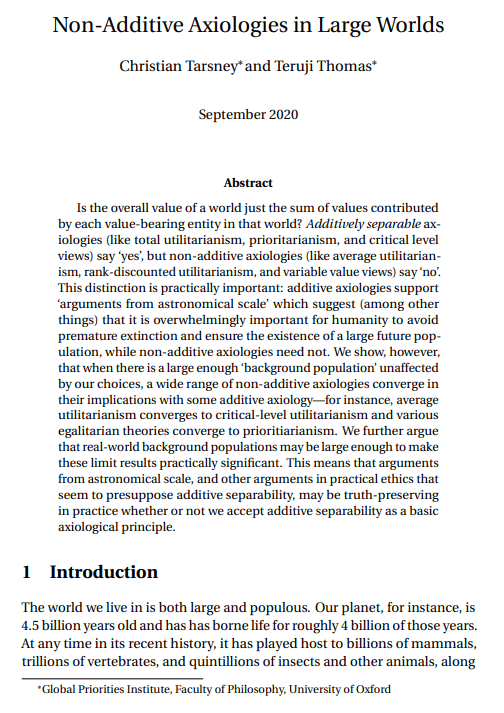Non-additive axiologies in large worlds
Christian Tarsney and Teruji Thomas (Global Priorities Institute, Oxford University)
GPI Working Paper No. 9-2020, forthcoming at Ergo.
Is the overall value of a world just the sum of values contributed by each value-bearing entity in that world? Additively separable axiologies (like total utilitarianism, prioritarianism, and critical level views) say ‘yes’, but non-additive axiologies (like average utilitarianism, rank-discounted utilitarianism, and variable value views) say ‘no’. This distinction is practically important: among other things, additive axiologies generally assign great importance to large changes in population size, and therefore tend to support strongly prioritizing the long-term survival of humanity over the interests of the present generation. Non-additive axiologies, on the other hand, need not support this kind of reasoning. We show, however, that when there is a large enough ‘background population’ unaffected by our choices, a wide range of non-additive axiologies converge in their implications with some additive axiology—for instance, average utilitarianism converges to critical-level utilitarianism and various egalitarian theories converge to prioritiarianism. We further argue that real-world background populations may be large enough to make these limit results practically significant. This means that arguments from the scale of potential future populations for the astronomical importance of avoiding existential catastrophe, and other arguments in practical ethics that seem to presuppose additive separability, may succeed in practice whether or not we accept additive separability as a basic axiological principle.
Other working papers
Are we living at the hinge of history? – William MacAskill (Global Priorities Institute, Oxford University)
In the final pages of On What Matters, Volume II, Derek Parfit comments: ‘We live during the hinge of history… If we act wisely in the next few centuries, humanity will survive its most dangerous and decisive period… What now matters most is that we avoid ending human history.’ This passage echoes Parfit’s comment, in Reasons and Persons, that ‘the next few centuries will be the most important in human history’. …
Cassandra’s Curse: A second tragedy of the commons – Philippe Colo (ETH Zurich)
This paper studies why scientific forecasts regarding exceptional or rare events generally fail to trigger adequate public response. I consider a game of contribution to a public bad. Prior to the game, I assume contributors receive non-verifiable expert advice regarding uncertain damages. In addition, I assume that the expert cares only about social welfare. Under mild assumptions, I show that no information transmission can happen at equilibrium when the number of contributors…
Towards shutdownable agents via stochastic choice – Elliott Thornley (Global Priorities Institute, University of Oxford), Alexander Roman (New College of Florida), Christos Ziakas (Independent), Leyton Ho (Brown University), and Louis Thomson (University of Oxford)
Some worry that advanced artificial agents may resist being shut down. The Incomplete Preferences Proposal (IPP) is an idea for ensuring that does not happen. A key part of the IPP is using a novel ‘Discounted Reward for Same-Length Trajectories (DReST)’ reward function to train agents to (1) pursue goals effectively conditional on each trajectory-length (be ‘USEFUL’), and (2) choose stochastically between different trajectory-lengths (be ‘NEUTRAL’ about trajectory-lengths). In this paper, we propose…

